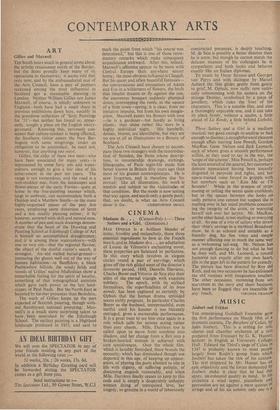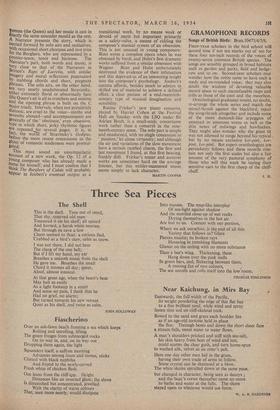THE enterprising. Guildhall Ensemble ga the first performance on March
18th of a dramatic cantata, The Burghers. of Calais, by John Joubert. This is a setting for soli, chorus and chamber orchestra of a tex prepared from Froissart by G. K. Hunter, lecturer in English at University College: Hull. Edward the Third's siege of Calais i 1347 is probably known to most people largely from Rodin's group from which, Jouberf has taken the title of his cantata. The text prepared by Mr. Hunter has all epic objectivity and the forces demanded l)t Joubert make it clear that he had this stony, un-coloured quality in mind. In his orchestra a wind septet, pianoforte and' percussion are set against a mere quintet .o strings and of his six soloists only one is a man (the Queen) and her music is cast in bitactly the same untender mould as the rest. A Narrator presents the story, which is Carried forward by solo airs and recitatives, With occasional short choruses and two trios for the Burghers, who are represented by a counter-tenor, tenon and baritone. The Narrator's part, both words and music, is Very close to that of the Narrators in Britten's Rape of Lucretia, with similar imagery and moral reflections punctuated by stabbing chords and short, pregnant Phrases. The solo airs, on the other hand, are very nearly unadulterated Stravinsky, either extremely florid or abnormally bare (the Queen's air is all in crotchets and minims and the opening phrase is built on the C Major triad). Intervals, when not primitively diatonic, are cruel to the voice—ninths and sevenths abound—and accompaniments are generally of the ' obstinate,' even obsessive, type in which short, jerky rhythmic figures are repeated for several pages. It is, in fact, the world of Stravinsky's Oedipus, before the more recent concessions to the ghost of romantic tenderness were promul- gated.
This must sound an unsympathetic account of a new work, the Op. 12 of a Young composer who has already made a name for himself; and I must confess that I think The Burghers of Calais will probably appear in Joubert's eventual output as a transitional work, by no means weak or devoid of merit but important primarily as a safety-valve, a means of ridding the composer's musical system of an obsession. This is not unusual in young composers: Bizet wrote a complete opera when he was obsessed by Verdi, and Hoist's first dramatic works suffered from a similar obsession with Wagner. Bizet and Hoist unfortunately destroyed the evidence of their infatuation and this deprived us of an interesting insight into the composer's psychology. Joubert's cantata affords, besides much to admire in _ skilled use of material to achieve a defined effect, a clear picture of a mid-twentieth- century type of musical imagination and sensibility.
Racine Fricker's new piano concerto, played by Harriet Cohen at the Festival Hall on Sunday with the LSO under Sir Adrian Boult, is a small-scale, concertante work rather than a concerto in the nine- teenth-century sense. The solo part is simple and unadorned, with no single concession to ' pianism,' let alone virtuosity; and although the air and variations of the slow movement have a certain rarefied charm, the first and last movement I found, at this first hearing, frankly dull. Fricker's tenser and austerer works are sometimes hard on the average listener, but this milder-mannered music seems simply to lack character.
MARTIN COOPER











































 Previous page
Previous page